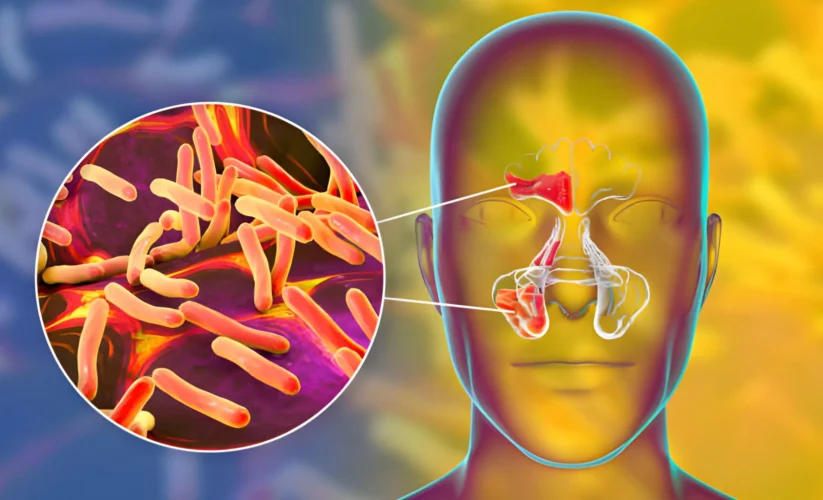
Are Sinus Infections Contagious? Expert suggestions
Sinus infections, also known as sinusitis, can be a painful and uncomfortable condition that affects millions of people each year because of this many people tend to think Whether Are Sinus Infections Contagious. As this One common question that often arises is whether sinus infections are contagious because of its widespread symptoms. In this article, we will delve into the topic of whether Are Sinus Infections Contagious to provide clarity on this matter.
What Causes Sinus Infections?
Before exploring about Whether Are Sinus Infections Contagious let’s first understand what causes sinus infection.
Sinus infections develop as a result of the sinuses becoming inflamed for any reasons like virus, bacteria, or fungus. Generally, its’ symptoms include nasal congestion, facial ache, headache, as well as coughing. Most often, this is caused by viral infections – e.g., the usual cold and influenza. At times, however, it could be triggered by fungi and bacteria too.
Are Sinus Infections Contagious?
The answer to this question whether Are Sinus Infections Contagious is both yes and no. Sinus infections themselves are not contagious, meaning that you cannot “catch” a sinus infection from someone who has one. However Are Sinus Infections Contagious through its viruses, then yes, the viruses or bacteria that cause sinus infections are indeed contagious. This means that if you are exposed to someone who has a cold or the flu, you may be at risk of developing a sinus infection yourself.
In the case of whether Are Sinus Infections Contagious through bacterial sinus infections, then these can sometimes be transmitted through close contact with an infected individual. This is why practicing good hygiene, such as washing your hands regularly and avoiding close contact with sick individuals, can help reduce your risk of developing a sinus infection.
How to Prevent Sinus Infections
Now that we know whether Are Sinus Infections Contagious or not it’s important to take some preventive measure.
Preventing sinus infections starts with practicing good hygiene. Make sure to wash your hands regularly, especially after being in public places or around sick individuals. Avoid close contact with people who are sick, and consider getting the flu vaccine to protect yourself from viral infections that can lead to sinusitis.
It is also essential to take care of your overall health by staying hydrated, eating a balanced diet, getting enough sleep, and managing stress. Thes factors can all play a role in boosting your immune system and reducing your risk of developing infections, including The confusion regarding whether Are Sinus Infections Contagious.
When to Seek Medical Help
If you suspecting whether are sinus infection contagious, it is essential to seek medical help. Your healthcare provider can diagnose your condition and recommend the appropriate treatment, which may include antibiotics for bacterial infections or symptom management for viral infections. It is crucial not to ignore symptoms such as severe facial pain, a high fever, or a persistent cough, as these may indicate a more serious infection that requires medical attention.
Conclusion
In conclusion, if you are wondering whether or not Are Sinus Infections Contagious then sinus infections themselves are not contagious, but the viruses and bacteria that cause them can be. By practicing good hygiene, taking care of your health, and seeking medical help when needed, you can reduce your risk of developing a sinus infection. If you have any concerns about whether are sinus infections contagious or are experiencing persistent symptoms, don’t hesitate to consult with a healthcare professional for personalized advice and treatment. Find out whether are sinus infections contagious and learn how to prevent them with simple hygiene practices and lifestyle habits.
FAQ’s
Are Sinus Infections Contagious from skin contact?
If you are wondering Are Sinus Infections Contagious then Sinus infections are typically not contagious through skin contact. They are usually caused by viruses or bacteria that are present in the sinus cavity and can be transmitted through respiratory droplets, such as when someone sneezes or coughs. However, Whether Are sinus infections contagious like cold or influenza then they are not considered highly contagious like the common cold or influenza.
It is still important to practice good hygiene, such as washing hands frequently and avoiding close contact with people who are sick, to reduce the risk of spreading the infection. It is advisable to speak with a healthcare professional if you think you may have a sinus infection so they can properly diagnose and treat you.
Should I stay home if I have a sinus infection?
Sinus infections are typically not contagious through skin contact. They are usually caused by viruses or bacteria that are present in the sinus cavity and can be transmitted through respiratory droplets, such as when someone sneezes or coughs. However, sinus infections are not considered highly contagious like the common cold or influenza.
It is still important to practice good hygiene, such as washing hands frequently and avoiding close contact with people who are sick, to reduce the risk of spreading the infection. If you suspect you may have a sinus infection symptoms, it is best to consult with a healthcare provider for an accurate diagnosis and appropriate treatment options for your infection.
How long will a sinus infection last?
Sinus infections are typically not contagious through skin contact. They are usually caused by viruses or bacteria that are present in the sinus cavity and can be transmitted through respiratory droplets, such as when someone sneezes or coughs. However, sinus infections are not considered highly contagious like the common cold or influenza.
It is still important to practice good hygiene, such as washing hands frequently and avoiding close contact with people who are sick, to reduce the risk of spreading the infection.
Do you sleep a lot with sinus infection
If you find yourself sleeping a lot due to sinus issues, it may be a sign that your sinuses are congested or inflamed. Sinus problems can disrupt your sleep by causing difficulty breathing, snoring, or even headaches. It’s important to address the underlying cause of your sinus issues to improve your sleep quality. Consider using a humidifier, saline nasal sprays, or steam inhalation to help relieve congestion.
Additionally, seeing a healthcare provider to explore treatment options such as medications or sinus irrigation may also be beneficial. Prioritizing good sleep hygiene practices and managing your sinus symptoms can help you get the rest you need for optimal health and well-being.





